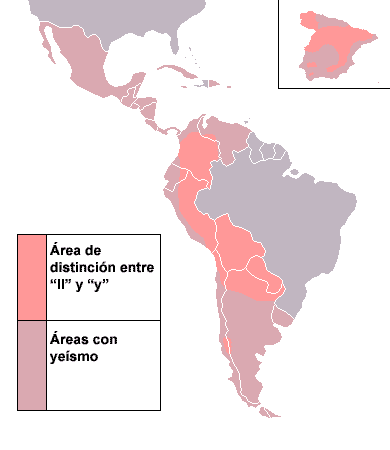Does “y” always sound like “ll”?
 |
| Yeísmo in America Photo credit: Davius licensed CC0 1.0 Universal |
Today, we will see how this works in Argentina. Why Argentina? Because these letters don’t see as much diversity in their pronunciation in any part of the world as they do in Argentina.
Pronunciation of “y” and “ll” in Argentina has been the subject of many serious researches and surveys and because of the extremely fluid nature of Spanish in today’s world, these regionalisms may or may not hold water in times to come. Hence, please read this article with a pinch of salt and do not treat these demarcations as etched in stone. Just see them as the state of affairs as of today, more or less. No language, let alone Spanish, can be declared to have a rigid accent-region association at all times; this can only be approximated at best.
Argentina: One country, many pronunciations
Most Argentineans pronounce these letters as either “sh” in “sheep” or as “s” in “measure”. You’ll rarely hear an Argentinean use the “llio” (of “million”), “j” (of “jello”) or “y” (of “yellow”) sound. Now the question that arises is which one, “sh” of “sheep” or “s” of “measure”? One study suggested once that this is a matter of education or, more significantly, social class. Those in the lower strata of the social hierarchy tend to veer in favor of “sh” of “sheep” while the more elite, educated class prefer “s” of “measure”.
The story doesn’t end here. Delve deeper and more shades of gray start popping out. For example, even the Porteños (residents of Buenos Aires) have a wide range of pronunciation. Most primary school teachers are heard teaching the “llio” of “million” for the letter, “ll”. This is deliberate and affects only “ll” and not “y”. The reason could be to reinforce the phonetic distinction between “y” and “ll” and help the children learn which word takes which letter.
This distinction, more often than not, diffuses with age and hardly any grown-up conversation is heard pronouncing “ll” as the “llio” of “million” anyplace in Buenos Aires. While most of Argentina follows the above-mentioned pronunciation, some indigenous people and those in the north-western parts do use the “y” sound of “yellow” for the Spanish “y” and “ll”, in line with the rest of (or rather, most of) Latin America.
Where are we headed?
 |
| Messi pronounces his “ll” as /sh/ like most others of his generation Photo credit: Adam Jones licensed CC BY-SA 2.0 |
Today, the trend is for younger Porteños to prefer the “sh” of “sheep” regardless of educational or social background while those of the older generation prefer the other pronunciation, i.e., “s” of “measure”. Endorsing this theory, the famous Argentinean soccer legend, Lionel Messi pronounces his “ll”/“y” as the “sh” of “sheep” despite being quite bit of an elite. Even if you consider the fact that Messi comes from Rosario, some 180 miles from Buenos Aires, it is still within the sphere of common linguistic influence known as the Rioplatense dialect area.
The indigenous influence
It is true that an overwhelming majority of Spanish speakers around the world, including those from Argentina, today don’t recognize the distinction between the Spanish “y” and “ll”. However, there are some exceptions to the rule even today. In Argentina, these people mainly come from the provinces of Corrientes and Misiones. Those from Corrientes pronounce their “y” as the “j” in “jello” and “ll” as the “llio” in “million”. The Misioneros, however, pronounce their “y” in a fashion that approximates the English “ch” sound. This could be attributed to the Guaraní influence on their speech. Nevertheless, barring these folks, as stated above, almost every Argentinean is a yeísta (one who doesn’t differenciate between the Spanish “y” and “ll”). Furthermore, the natives of Cuyo, Córdoba, and the Mesopotamia regions don’t use the “s” and “sh” sounds of “measure” and “sheep” respectively!
These idiosyncrasies of Argentinean Spanish are not meant to put you off-base with information overload. They are here only to demonstrate the extremely volatile nature of Spanish and give you some fun trivia. As far as your learning is concerned, you just need to focus on the way these letters are pronounced in the specific dialect of Spanish that you are targeting. If you don’t have any particular dialect on your mind (it is highly recommended though that you choose one right at the onset; you’ll only thank yourself later that you did), you’ll be understood everywhere in the Milky Way if you just use the “y” of “yellow” or “j” of “jello” for both “ll” and “y” in all contexts.
















0 comments:
Post a Comment